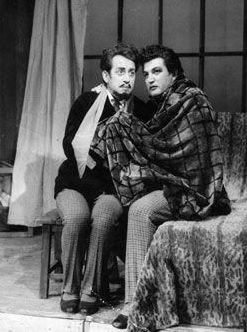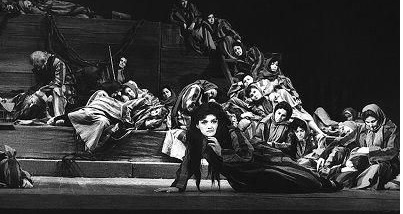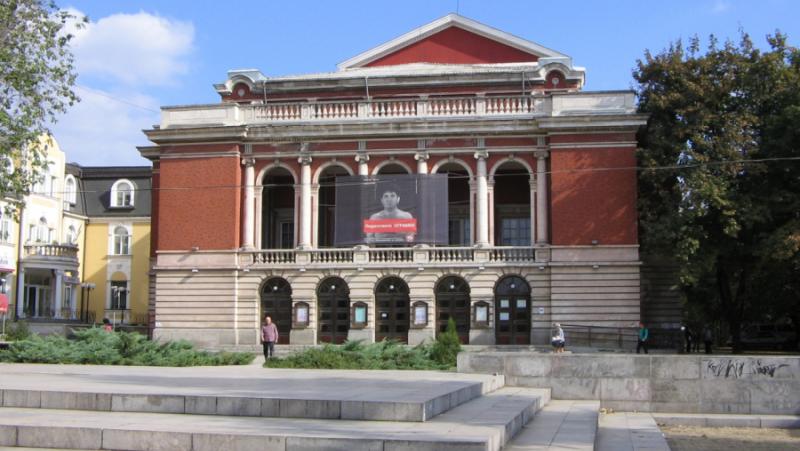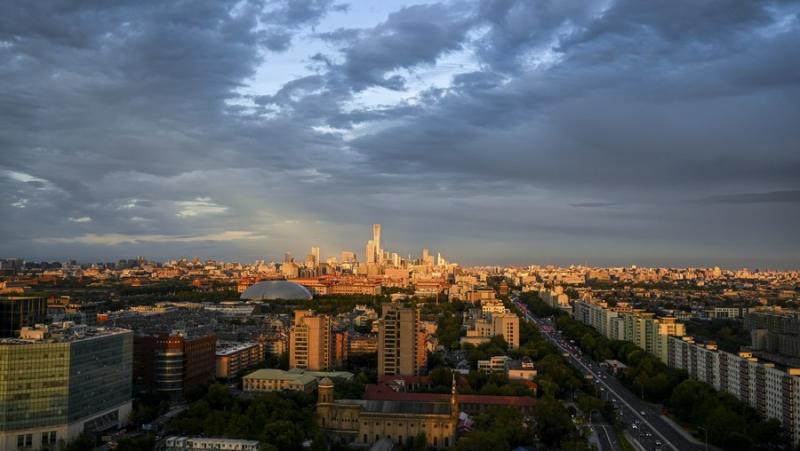/ world today news/ On November 27, the Rousse State Opera will celebrate its 70th anniversary with a gala performance of “La Traviata”.
After Sofia, Stara Zagora and Varna, Ruse is the fourth city in our country to open a state opera theater. Before the war, four times (1914, 1919, 1935 and 1943) attempts were made to establish a professional music scene, but unfortunately, without success. Only after the war, in the spring of 1948, a state symphony orchestra was formed and this became the basis for the creation of an opera. And so – 60 years ago – on November 27, 1949, the curtain of the beautiful Baroque Revenue Building – the Sava Ognyanov Drama Theater was raised for the first performance of Verdi’s La Traviata. This is a memorable premiere for the city and its cultural audience, carried out by a strong staging team: Dragan Kardzhiev (director), Konstantin Iliev (conductor) and Asen Popov (set designer). The main roles are played by the vocal young singers: Kiril Krastev (Georges Germont), Kosyu Lungov (Alfred) and Brilyanta Kevorkian (Violetta). Later, the star of a charming young talent rose in the central role – Penka Marinova, the future prima donna of the troupe.
The resonance of the premiere was great – it was welcomed as a national cultural event. In the beginning, the difficulties for the young staff and its leadership (a little later, the Ruse Opera will be headed by an incredibly dedicated person to art, the writer Georgi Chendov, a real director-builder, I emphasize “builder”, because, unfortunately, he will later there are also directors-careerists and destroyers!) are really big and of every nature, but they are overcome with a lot of love, dedication and revival enthusiasm. And very soon, the Ruse National Opera established itself not only in the region, but also in the capital and the country, and already in the 1950s, the catchphrase: “And the Milan Rock is not in Rome!” was often quoted there.
The productions that followed “La Traviata”: “Madame Butterfly”, “Bohemia”, “Rigoletto”, “The Abduction from Saraya”, “Giselle”, “Gioconde”, “Pearl Hunters”, “Manon”, the work of the directors Mikhail Khadzhimishev, Stefan Trifonov, Evgeni Nemirov and the conductors Konstantin Iliev, Dobrin Petkov, Lyuben Pintev, Ruslan Raichev, Mikhail Lefterov are true examples of great art, of contemporary ensemble musical theater. Some of them have been awarded at the national opera reviews and defined as “exemplary” and “reference”. Even then, the Ruse Opera established itself as a “theater of singers” and for a long time it remained as such in the minds of the Bulgarian cultural public. And Ruse singers are extremely gifted, artistic, musical, emotional, dedicated! They love their theater and when they receive invitations to work on bigger stages, they always refuse, because of their beloved Ruse!
The atmosphere in this city has always been creative, there was a lot of fruitful work, and the audience also loved its singers, knew them, followed their careers – many of them were her favorites and had the halo of stars… It cannot be here not to mention the merit of the long-time chief conductor Romeo Raichev, who largely completed the soloist composition of the opera. A conductor-builder and theatre-goer, he loves opera and, most importantly, the singers, to whom he gives all his strength and talent. In his time, the Ruse Opera had 9 tenors (!) for its extremely rich and varied repertoire, from Mozart and Chimarosa to Prokofiev, Shostakovich and Pipkov.
The first foreign tour of the Rousse Opera (this was also the first appearance abroad of a Bulgarian non-capital theater) in 1956 in Timisoara, Romania with “Peasant Honor”, “Mazepa” and “Pearl Hunters” in front of an extremely demanding audience and critics from Timisoara, Bucharest and Vienna – passes triumphantly and marks the beginning of creative contacts with the theaters of Bucharest, Brasov, Galaţi, Constanta and Timisoara. An extremely fruitful collaboration, which, in addition to the mutual visits of ensembles, individual producers and soloists, also brought three of the most successful premieres on the Ruse stage – the large-scale productions of: “Aida”, “Carmen” and “Othello” by the famous Romanian director prof. Jean Ranzescu. These performances become national cultural events, and critics define them as “standard”, “unsurpassed”…
From the beginning of the fifties to the end of the seventies, the Ruse Opera experienced a real flourishing. Her troupe numbers nearly 40 soloists, of which 9 are tenors, has a first-class choir, a very good orchestra, a strong ballet troupe (which gives two solo performances every week!) and a very stable, dedicated and honorable leadership in the person of the aforementioned Georgi Chendov. Kosta Krushovenski, Stefan Trifonov, Mihail Katev and Romeo Raychev.
The possibilities of the theater are really great – an impressive repertoire is realized – from Mozart, Pergolesi and Cimarosa to Prokofiev, Pipkov and Shostakovich. For the first time outside the capital, the following are performed here: Wagner (“The Flying Dutchman” and “Tannhäuser”), Saint-Saëns (“Samson and Delilah”), Shostakovich (“Katerina Izmailova”), “Sad Monday” (Gerswin), the operas of Verdi: “Aida”, “Don Carlos”, “Macbeth”, “Othello”, “Simon Boccanegra” and “Stifellio”, as well as “The Girl from the Golden West”, “The Mantle” and “Turandot” by Puccini…
The performances of: “Pearl Hunters”, “Manon”, “Gioconda”, “The Merry Windsors” by Otto Nikolay, “Broken Bride” by Smetana, “Crazy Gidiya” by Hadjiev, “Mornings here are quiet” by Molchanov will remain memorable. , “Hansel and Gretel” by Humperdinck, “Semyon Kotko” and “Engagement in the Monastery” by Prokofiev, “Werther” by” Massenet, “Gypsy Baron” by Strauss, “Fra Diavolo” by Ober, “Prince Igor” by Borodin , “Faust” by Gounod, “The Magic Flute” and “The Marriage of Figaro” by Mozart, “The Secret Marriage” by Cimarosa, “The Maid-Mistress” by Pergolesi, “The King and the Carpenter” by Lorzing, “Lakme” by Delibes, ” The Janine Nine Brothers” by Pipkov, “The Human Voice” by Poulenc… A large series of large-scale performances of Bulgarian musical-stage works such as: “Momchil” and “Antigone 43” by Pipkov, “Summer 893” and “Maria Desislava” were realized. of Khadzhiev, the second, “Russene”, version of “Tsar Kaloyan” by Vladigerov, operas and ballets by Lyubomir Pipkov, Nayden Gerov, Dimitar Sagaev, Marin Goleminov, Alexander Raychev, Maestro Atanasov, Alexander Yosifov, Simeon Pironkov, Krasimir Kyurkchiyski – not a small one some of them for the first time in our country. Little-known titles by Verdi, Puccini, Chilea, Rossini, Donizetti, Menotti, Mozart, Khrennikov, Prokofiev, Molchanov, Bartók, Gershwin, Poulenc, Stravinsky are played. Each month, the theater’s schedule includes 18 to 25 performances of operas, ballets and operettas, and the annual schedule includes up to 30 different titles, with 4 to 6 being the premieres! And for years, every season has traditionally opened with a Bulgarian work. For most of the roles in the classical repertoire, the Rousse Opera has its own double, triple, and quadruple ensembles (even for operas such as “Ball with Masks”, “Othello”, “Macbeth”, “Andre Chenier”, “Aida” and “Simon Bocanegra”), of course, first-class foreign performers also visit, but the interesting thing is that the “singing city” has so many singers and of such quality that it feeds both the capital’s and other Bulgarian stages with its own performers.
During these years, a constellation of first-class soloists grew up in Ruse – starting with those from the so-called “first generation” and the founders (Kyril Krastev, Penka Marinova, Nikolay Zdravkov, Hristo Krondev, Kosyu Lungov, Alexey Milkovski), after them through the “second generation” (Ana Georgieva, Todor Bonev, Ana Angelova, Mikhail Petrov, Ivan Dimov, Anastas Anastasov, Tsvetana Todorova, Margarita Radulova, Nedelcho Pavlov, Evgenia Babacheva, Nadia Kharitonova), then the “third” (Penka Dilova, Roza Mitova, Maria Venceslavova, Stefan Dimitrov, Ivan Dobrev, Kunka Kuzmanova), the “fourth” (Violeta Shahanova, Konstantin Yankov, Emilia Boteva, Evgeni Ganev) and the singers after them – it is really difficult to list the most outstanding and deserving ones. This is, in fact, the great wealth of the theater – its first-class singer-actors, for the growth of which the directors who worked with them the longest and most effectively are to be credited: Associate Professor Stefan Trifonov, Mikhail Khadzhimishev, Evgeni Nemirov and Academician Plamen Kartalov, as well as a number of high-class conductors such as: Ruslan Raichev, Romeo Raichev, Lyuben Pintev, Mikhail Lefterov, Prof. Boris Khinchev, Dimitar Manolov, Ivan Marinov, Mikhail Angelov. The participation of Veselin Baichev, Milen Nachev, Ivan Filev was also fruitful.
Of course, merits for the reputation of the Ruse Opera also belong to singers who have been here for shorter periods (Alexei Milkovski, Maria Bohachek, Nedelcho Pavlov, Evgenia Babacheva, Ana Georgieva, Ivan Konsulov, Stefka Evstatieva, Asen Selimski, Evelina Stoitseva, Marin Iliev, Evdokia Zdravkova, Mariana Tsvetkova, Tsvetan Mihailov), but they also leave a visible mark in the history of the institute.
|
As guest soloists, Ruseians applaud the great art of world opera stars: Gyaurov, Guzelev, Mazarov, Kabaivanska, Elena Nikolay, Nikolae Herlya, Nikola Nikolov, Katya Popova, Zenaida Pali, Elena Chernei, Peter Glossop, Arta Florescu, Silvia Shash, Bruno Sebastian, Felicity Weathers, Gloria Lind, Octave Enigarescu, Vilma Lipp, Bela Rudenko, Paolo Barbachini, Elena Obraztsova, Vladimir Atlantov, Ludovic Spies… On the Ruse stage, famous directors from the ranks of: Jean Runzescu, Hero Lupescu, George Zaharescu, Natalia Satz, Wolfgang Gubisch, Oscar Figueroa, Manfred Straube, Emil Pasenkov, Josef Novak – from the directors, Kurt Adler, Mark Ermler, Ude Nissen, Jean Bobescu, Ezhizio Masini, Tamas Pal, Asen Naydenov, Cornel Trailescu, Ivan Marinov, Radosveta Boyadzhieva – from the conductors… During these years, the Ruse Ballet, created by the unforgettable Asen Manolov, also had serious achievements. His realizations of: “Giselle”, “Swan Lake”, “The Nutcracker”, “New Odyssey” mark real peaks in the history of the Bulgarian ballet theater. Merits for the growth of this composition, without a doubt, also belong to a number of artists such as: Mercedes Pavelich, Petar Lukanov, Viktor Vlase, Margarita Arnaudova, Asen Gavrilov, Stoyan Georgiev, Kalina Bogoeva, Hari Mehmedov, who have performed a large number of successful performances on music of classical and modern authors, quite a few of them for the first time in our country… The Ruse Opera Choir is also vocal, artistic and emotional. It was created by two revival enthusiasts – choir conductors Ilia Yordanov and Ilia Iliev, with whom he achieved his first major professional successes. As a first-class composition, capable of handling even the most difficult operatic scores, it grew in the 60s and 70s, under the leadership of the talented choirmasters Nikolay Nikolaev, Atanas Dimitrov and especially Tomina Sidova, a high-class musician. The merits of the director Assoc. Stefan Trifonov are also huge, thanks to whom the choristers become real artists, some of them also become soloists… If we have to note the other characteristic feature of the theater – it is its ensemble, achieved with daily, hard work in the rehearsal halls on the part of all groups (soloists, choir, orchestra, ballet, technical services), and also with a serious and wise long-term planning on the part of the artistic management, for which the interests of the theater were always in the foreground, far before their own, personal interests. Perhaps this is precisely what accounts for the great and lasting success and indisputable authority of the Ruse Opera over the years. THREE HIGHLIGHTS FROM THE HISTORY OF THE RUSENA OPERA |
Violeta Shahanova /Zornitsa/ and Penka Dilova /The Mother/, two artists with a permanent presence in the composition – in “Lud Gidiya”, a production in honor of the 75th anniversary of Parashkev Hadjiev – a happy moment in the history of the Ruse Opera – March Music Days – 1987

Kiril Krastev /Marcel/ and Todor Bonev /Rudolph/ in the memorable first production of “Bohemia”, the work of the then young enthusiasts Dobrin Petkov and Mikhail Hadjimishev, 1951

The unforgettable Evelina Stoitseva in the first and still unsurpassed production of “Katerina Izmailova”, highly appreciated by the author Shostakovich – March Musical Days, 1965
#Jubilee #Rousse #Opera #musical #theater #class


